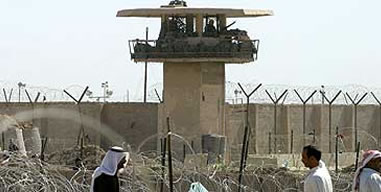TO SOME, including the U.S. government, the Mujahedin-e Khalq (MEK) is a terrorist organization that is responsible for the deaths of hundreds, if not thousands, of civilians, including Americans in Tehran in the 1970s. To others, it is the voice of democratic Iranian opposition.
This debate, fueled in part by the group’s handsomely paid stable of former U.S. officials who act as advocates, should be put aside to focus on a much more immediate and potentially explosive problem.
Come Dec. 31, Iraqi Prime Minister Nouri al-Maliki has ordered the closure of Camp Ashraf, an encampment 35 miles north of Baghdad that has been home for 25 years to members of the MEK. The camp currently houses some 3,400 people. The MEK fled Iran in the mid-1980s and took up arms with Saddam Hussein in the fight against Iran; the group has also been linked to Hussein’s violent suppression of Iraqi Shiites and Kurds, according to the Council on Foreign Relations. Incidents of terrorism attributed to MEK have significantly declined since 2001, but hostility to the group still runs high and was evident in the April massacre of dozens of Camp Ashraf residents by Iraqi forces.
The bloodshed could be even worse if the remaining residents are not moved out of the camp by Mr. Maliki’s deadline, which coincides with the pullout of U.S. troops. Some fear that Mr. Maliki could turn a blind eye to violence at Camp Ashraf or forcibly send to Iran MEK members, who fear persecution.
The Obama administration has won Iraqi agreement for a plan that could avoid these outcomes. Overseen by Martin Kobler, the U.N. envoy to Iraq, it calls for the MEK members to be moved to the United States’ former Camp Liberty base, near Baghdad’s international airport, where they would be interviewed and processed by the United Nations’ refugee agency. Interviews would be done individually, allowing each person to state his or her wishes for relocation without intimidation from the group’s leaders. The United Nations would monitor the process to protect against abuses. Officials say none of the MEK members would be returned to Iran against their will.
This is a decent solution to a thorny problem. The sticking point is the MEK’s Paris-based leadership, which is demanding that U.S. troops or U.N. peacekeeping forces provide security at the new camp. With the last U.S. soldiers on the way out and U.N. peacekeepers nowhere in sight, which is a condition that can’t and won’t be met. It’s time for the MEK — and its American mouthpieces — to drop unrealistic demands and accept a plan that offers the best chance to safeguard its members.

